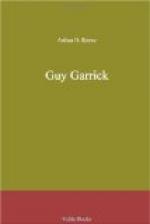Another moving and talking picture was under way. This time it seemed to be a race between two automobiles. They were tearing along, and the sound of the rapidly working cylinders was most real. The rearmost was rapidly overhauling that in front. Imagine our surprise as it crept up on the other to see the driver rise, whip out a pistol, and fire point blank at the other as he dashed ahead, and the picture stopped.
A suppressed scream escaped Violet Winslow. It was too much like what had happened to Mortimer Warrington for her to repress the shudder that swept over her, and an involuntary movement toward him to make sure that it was not real.
Still Garrick did not move from his post at the galvanometer. He was taking no chances. He had us thrilled, tense, and he meant to take advantage to the full in reading the truth in the dramatic situation he had so skilfully created.
Another picture started almost on the heels of the last. It was of the robbery of a safe. Then came another, a firebug at work in starting a conflagration. We could hear the crackling of flames, the shouts of the people, the clang of bells, and the hasty tread of the firemen as they advanced and put out the blaze. The film play was one of those which never fail to attract, where the makers had gone to the utmost extent of realism and had actually set fire to a house to get the true effect.
The next was a scene from a detective play, pure and simple, in which that marvellous little instrument which had served us in such good stead in this case was played up strongly, the detectaphone. Then followed a scene from another play in which a young girl was kidnapped and rescued by her lover just in the nick of time. Nothing could have been selected to arouse the feelings of the little audience to a higher pitch.
The last of the series, which I knew was to be a climax, was not an American picture. It was quite evidently made in Paris and was from actual life. I myself had been startled when the title was announced by the voice and on the screen simultaneously, “The Siege of the Motor Bandits by the Paris Police.”
It was terrific. It began with the shouts of the crowd urging on the police, the crack of revolvers and guns from a little house or garage in the suburbs, the advance and retreat of the gendarmes on the stronghold. Back and forth the battle waged. One could hear the sharp orders of the police, the shrill taunts of the bandits, the sounds of battle.
Then at a point where the bandits seemed to have beaten off the attack successfully, there came an automobile. From it I could see the police take an object which I now knew must be a Mathiot gun. The huge thing was set up and carefully aimed. Then with a dull roar it was fired.
We could see the bomb hurtling through the air, see it strike the little house with a cloud of smoke and dust, hear the report of the explosion, the shouts of dismay of the bandits—then silence. A cry went up from the crowd as the police now pressed forward in a mass and rushed into the house, disclosing the last scene—in which the bandits were suffocated.




